Mary Anne Yarde's Blog: The Coffee Pot Book Club , page 95
April 8, 2020
Check out Gretchen Jeannette's fabulous book — The Devil Take Tomorrow #HistoricalRomance #AmericanRevolution #HistoricalFiction @GAJeannette

The Devil Take TomorrowBy Gretchen Jeannette

George Washington has been marked for death. British agents embedded in the Continental Army wait only for the order to strike. Racing against time, rebel spy Ethan Matlock sets out to protect the one man who can save the Revolution. Without General Washington, the whole American enterprise might easily collapse, for no one else has demonstrated the ability to keep together an army that constantly threatens to fall apart.
Boldly Ethan infiltrates the heart of the British military, occupiers of grand old Philadelphia, where elegant officers posture in drawing rooms and frolic in the bedrooms of the rich. Surrounded by twenty thousand redcoats, aware that the slightest misstep could lead to the gallows, Ethan resorts to vicious measures to unravel a conspiracy of power-hungry men. Against his better judgment, he becomes entangled with the provocative Miss Maddie Graves, whose fierce devotion to the American cause ironically threatens his mission.
Excerpt
Gripping Maddie’s arm, Ethan escorted her along the meandering path, past the darkened stable to his cottage, alert all the while for prying eyes. Once inside, he locked the door, lit a candle in a wall sconce, and closed the window shutters.
“Sit down,” he said in a soft but commanding voice.
She sat on the sofa, her hands folded in her lap.
“What did you hear?”
“Nothing. I was merely getting some air.”
“Don’t play games with me, Miss Graves.”
She cast her gaze downward. “Robert is up to something, and I want to know what it is. What’s wrong with that?”
“That depends on who you tell.”
“First I would need to hear something worth telling, but you certainly took care of that.”
Bending his head, he rubbed the back of his neck. “Jesus Christ,” he swore softly. “In case you’ve forgotten, spying is a hanging offense. Oh, and by the way, the British hang women too. It’s a hard death and rarely quick. Is that how you want to end up, with your pretty neck stretched?”
She looked up with supplication in her eyes. “I’ve heard that the British commit all manner of vile acts against women. I can’t imagine a chivalrous man like you would deliver me into their hands. Believe me; I meant no harm. Surely you can find it in your heart to overlook my indiscretion, and then we can forget this ever happened.”
“Nice try,” he said. Pulling over a side chair, he sat facing her. He leaned forward until they were eye to eye. “I’ll ask you once more. What did you hear?”
She hugged her arms and watched the floor, refusing to look at him. After a moment she divulged, “They were arguing. Robert called General Howe a procrastinator, which he is. And the general called Robert a power-hungry egotist with a talent for needless cruelty, which he most certainly is. Then General Mitchell accused them both of behaving like schoolboys.”
Ethan’s hopes plummeted. “Nothing more?”
“No. Thanks to you.”
Did he dare believe her? That winsome face could be hiding anything. He watched the rise and fall of the soft swells of flesh above her bodice, the spellbinding view inciting remembrance. The sweet taste of her mouth had not entirely faded, nor the imprint of her contours on his senses. She was young, certainly, but the fresh-faced radiance that made her so pretty had begun to sharpen into womanly beauty. “How old are you?”
She swept a stray curl away from her eyes. “A man should never ask a woman her age.”
“Well, I just did.”
“And you pass yourself off as a gentleman. If you must know, I’m eighteen.”
“Old enough to have some common sense.”
“And how old are you?”
“Twenty-seven.”
“Too old to acquire manners, I suppose.”
He checked a retort, not about to be diverted. “This isn’t about me, Miss Graves. It’s about you spying on the commander in chief of His Majesty’s armies in America.”
“I told you, I’m only curious to know what Robert is doing.”
“I find it hard to believe that mere curiosity compelled you to scale a trellis in that gown. To whom were you to report your findings?”
“No one. I acted on my own.”
“For what purpose?”
She sighed. “To learn things about Robert,” she said slowly and succinctly. “Are you deaf or just slow-witted?”
Now he wanted to strangle her, for her insolence, her reckless bravery; above all, for her power to arouse his emotions. “Why do you dislike him?”
She had seemed beyond fazing, yet this stopped her cold. She swallowed hard, the color rising in her cheeks. “Your assessment of my feeling for him falls short.”
“Pardon me. Why do you hate him?”
“He conspired to deliver my father to hell on earth.”
Ethan blinked. “How do you know that?”
“I just know,” she said bitterly, “and if I can prove it, I will kill him.”He felt the force of her distress like a physical blow. In the pale wash of candlelight, he delved into glittering green eyes with the sensation of looking into a mirror. He wished to tell her that she wasn’t alone in her pursuit of justice or, indeed, in her pain. He had not been chasing his own demons for so long without being able to empathize with a kindred soul.She wiped at her eyes, and the power of her spell snapped like a fragile glass stem.
“That may be the first honest thing you’ve told me,” he said. “By any chance, did you send him a hangman’s noose in New York?”
She regarded him warily. “Who told you about that?”
“Just answer me.”
“Yes, I sent it. And I made certain I was there to see his face when he opened it.”
Ethan drummed his fingertips on the chair arms. He had confronted many women in his life but only one so boldly obstinate. He felt as frustrated now as he had then.
So,” she ventured, “when do you plan to betray me to General Howe?”
Her mutinous expression made him smile. “If that was my intention, I wouldn’t have kissed you. Thanks for the bruised foot, by the way.”
She blushed quite pink but did not look away. “You shouldn’t have taken advantage like that.”
Again, he felt her allure pulling at him, undermining his position as the one in control. “Perhaps it was my imagination, but you seemed to enjoy yourself rather profoundly, and that ballet you performed with your tongue was nothing short of sublime. All that aside, I had to do something to cover your carelessness. Frankly, I’ve seen children play hide-and-seek with more stealth.”
She drew a deep breath, the muscles of her jaw tensing, but no barb passed her lips.
He couldn’t help but admire her composure. Before him sat an extraordinary young woman, possibly the most beautiful he had ever seen. Granted, she could be pert with her words, but she possessed a certain bearing and poise that he found delightful to behold, the ideal of feminine charm. That she was deeply devoted to her father was moving. That she would risk her neck to avenge him was downright alarming. “This is what I propose,” he said. “On my honor, I won’t say a word about tonight to anyone, provided you swear an oath to stop spying.”
She shifted a little, her mouth forming a delicate frown as she glanced about the cottage, everywhere but at him.
“Look at me and swear it,” he demanded.
She took her time, clearly unhappy at having to comply with his ultimatum. When she finally met his gaze, the melancholy he saw on her face pierced him to the quick. “I swear,” she said, her voice pitched low and resigned. With a small sigh, she began to re-pin her tousled hair. “What were you doing out there anyway?”
“I came after my pistols for the shooting contest, but the sight of you stopped me in my tracks. You shouldn’t wear that color to sneak around in the dark.”
“I’ll try to remember that.”
“Just remember you gave me your word.”
He retrieved his pistols, hanging in leather saddle holsters from a peg, and his cartridge box. Edged weapons in scabbards hung beside the guns—an ivory-hilted dagger, a curved officer’s saber, the brass guard wearing an eagle’s head pommel, the fluted hilt carved from bone. Other than tools of war, he displayed no personal items in the room, nothing to offer insight into his privacy.
When he held out his hand, she hesitated but then clasped it and rose to her feet. She stood very still, near enough for him to detect a faint heat from her body. He breathed in the heady aura of lilac perfume. “I don’t want to see you get hurt.”
“How noble of you.”
His mouth twitched in the barest hint of amusement. “You inspire such virtues, Miss Graves.” At last he saw what he desired, a soft smile that reached her lovely eyes. He touched her again, briefly and gently laying the back of his hand against her cheek. “Come back to the party. You owe me a dance.”
Pick up your copy ofThis Day is OursAmazon UK • Amazon US
The Coffee Pot Book Club★★★★★ Highly RecommendedRead the full review HERE!

Gretchen Jeannette
 Gretchen lives and works in Chester County, Pennsylvania, an area rich in Revolutionary War and Colonial American history. Her enduring interest in 18th Century America began at a young age, inspired by tales of adventure, romance, and early American lore. After working as an editor for a small publishing company, she decided to write a story of her own. So began a journey fueled by her passion for breathing life into history through believable characters, authentic historical details, and stories woven with romance, action, and adventure.
Gretchen lives and works in Chester County, Pennsylvania, an area rich in Revolutionary War and Colonial American history. Her enduring interest in 18th Century America began at a young age, inspired by tales of adventure, romance, and early American lore. After working as an editor for a small publishing company, she decided to write a story of her own. So began a journey fueled by her passion for breathing life into history through believable characters, authentic historical details, and stories woven with romance, action, and adventure.Connect with Gretchen: Website • Twitter • Goodreads.
Published on April 08, 2020 20:00
April 7, 2020
#BookReview — The Potential For Love by Catherine Kullmann #RegencyRomance @CKullmannAuthor
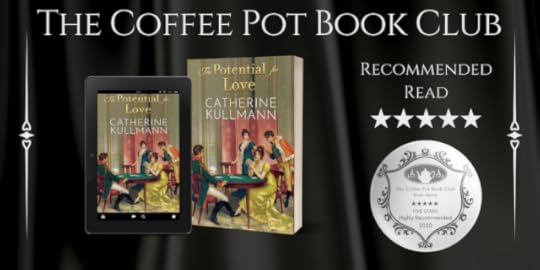
The Potential For LoveBy Catherine Kullmann

When Arabella Malvin sees the figure of an officer silhouetted against the sun, for one interminable moment she thinks he is her brother, against all odds home from Waterloo. But it is Major Thomas Ferraunt, the rector’s son, newly returned from occupied Paris who stands in front of her.
For over six years, Thomas’s thoughts have been of war. Now he must ask himself what his place is in this new world and what he wants from it. More and more, his thoughts turn to Miss Malvin, but would Lord Malvin agree to such a mismatch for his daughter, especially when she is being courted by Lord Henry Danlow?
As Arabella embarks on her fourth Season, she finds herself more in demand than ever before. But she is tired of the life of a debutante, waiting in the wings for her real life to begin. She is ready to marry. But which of her suitors has the potential for love and who will agree to the type of marriage she wants?
As she struggles to make her choice, she is faced with danger from an unexpected quarter while Thomas is stunned by a new challenge. Will these events bring them together or drive them apart?

"Be honest with yourself and, when the time comes, be honest with him. There is no place for dissimulation within love, and if you feel you must pretend to be someone other than you are, then he is not the right man for you."
Lord Henry Danlow is the perfect suitor. He is charming, titled, and she has caught his eye. But while others may have rejoiced at such a match, Arabella “Bella” Malvin found Lord Henry’s attention somewhat disturbing. Lord Henry does not seem interested in anything Bella has to say, and besides, when she is with him, she cannot help but wish she were with another.
Major Thomas Ferraunt had been through Hell and back. Five long years of war on the continent had left him with his fair share of scars — both the visible kinds and the ones that could not be seen. Now, he is at a crossroads. He wants a family, a home, a woman to adore for the rest of her life. These things, the army cannot give him. If only he were brave enough to tell Bella how much she means to him. But who was he trying to fool? He was shooting for the stars. He had no right to imagine a life with Bella.
If only Lord Henry were Major Ferraunt, then Bella would embrace his advances, and she would marry him. If only…
From a bittersweet reunion to an unforeseen danger, The Potential For Love by Catherine Kullmann is a Regency Romance triumph.
This richly detailed and emotionally charged tale is brought to life in all of its glorious splendour by Kullmann. With an enthralling narrative and a novelist eye for human fragility and frailty, Kullmann has presented her readers with a romance that is as tender as it is believable. I adored how Kullmann, with a seemingly effortless dip of her quill, penned a story that is not only beguiling but one that is near on impossible to turn away from. I was thoroughly enchanted with this novel from beginning to end.
The Potential For Love is a slow burn of desire and passion. It is a love story about a couple who should know better than to fall in love with each other. In a world where breeding and your standing in society was considered more important than your morals, or your rakish behaviour, the romance between Arabella Malvin and Major Thomas Ferraunt was decidedly refreshing. Thomas is no handsome rake. He is the rector's son. And yet he is worth a hundred Lord Henry’s.
I adored Kullmann's portrayal of Bella. Bella is a very insightful young woman who does not suffer fools gladly. She realises that all that glitters is not gold and her head is not turned by wealth and titles. She is, however, acutely aware of her place in the world and the expectations that her family have of her. Bella is extremely concerned that she will lose all control of not only her finances but also her freedom if she chooses to marry the wrong man. Bella's careful consideration of Lord Henry's courtship demonstrated Bella's level of maturity. In contrast, her relationship with Thomas is irresistible. Their story is one of awakening desires and shy first kisses.
Where do I even begin to describe how wonderful Thomas' depiction was. Thomas is a refreshing hero. So often in Regency Romances, the story is about a rake who is reformed by the young and innocent debutant, but in this story, Thomas is a man of integrity. He is the kind of person you would want your daughter to marry. He is kind. He is thoughtful. He is genuinely likeable. Thomas is undoubtedly swoon-worthy material. I thought Kullmann's depiction of Thomas was sublime. I loved him.
As with all romances, there is a complication, and in this case, a very dangerous one, who threatens to destroy the protagonists’ relationship. I am not going to give away any spoilers, but the antagonist in this tale is a seemingly unlikely one, and the lengths he is prepared to go to achieve his aims are quite extraordinary. I did fear for Bella's safety on more than one occasion. Kullmann has given her readers a very coldly calculating antagonist who sent shivers up my spine. Kudos, Ms Kullmann.
The historical detailing in this novel has to be commended. Kullmann has written her book with a keen sense of time and place. Kullmann also writes with both elegance and authority, which gives her story a sense of realism. And not only does Kullmann write with sensitivity to the era but she also has a novelist intuition for this book’s intended audience.
I felt that there is an essence of Jane Austen's Sense and Sensibility in this story, which made The Potential For Love absolutely irresistible. There is an edge of satire in Kullmann’s portrayal of le bon ton, as there is in Austen's books. Kullmann also cleverly describes the plight of women in the early 19th Century with objectivity. However, unlike Austen, Kullmann has delivered what modern readers expect from a Regency Romance. The story is compelling, and it is incredibly fast-paced — this is the kind of book that can be enjoyed while drinking a warm cup of hot chocolate.
If you are a lover of quality Regency Romance, then The Potential For Love by Catherine Kullmann certainly deserves a place on your bookshelf and in your heart. I loved every syllable, every word, every sentence. It is, in all ways, a real treat.
I Highly Recommend.
Review by Mary Anne Yarde.The Coffee Pot Book Club.
Pick up your copy ofThe Potential For LoveAmazon UK • Amazon US
Catherine Kullmann
 I was born and educated in Dublin. Following a three-year courtship conducted mostly by letter, I moved to Germany where I lived for twenty-five years before returning to Ireland. I have worked in the Irish and New Zealand public services and in the private sector.
I was born and educated in Dublin. Following a three-year courtship conducted mostly by letter, I moved to Germany where I lived for twenty-five years before returning to Ireland. I have worked in the Irish and New Zealand public services and in the private sector.I have a keen sense of history and of connection with the past which so often determines the present. I am fascinated by people. I love a good story, especially when characters come to life in a book.
I have always enjoyed writing, I love the fall of words, the shaping of an expressive phrase, the satisfaction when a sentence conveys my meaning exactly. I enjoy plotting and revel in the challenge of evoking a historic era for characters who behave authentically in their period while making their actions and decisions plausible and sympathetic to a modern reader. In addition, I am fanatical about language, especially using the right language as it would have been used during the period about which I am writing. But rewarding as all this craft is, there is nothing to match the moment when a book takes flight, when your characters suddenly determine the route of their journey.
Connect with Catherine: Website • Twitter • Goodreads.
Published on April 07, 2020 20:00
April 6, 2020
Join author, Lesley Wilson, as she takes a look at the trials and tribulations of food preparation in the 14th century. There is also a chance to check out Lesley's fabulous series — The Oric Trilogy #YoungAdult #HistoricalFantasy @OmlaLesley
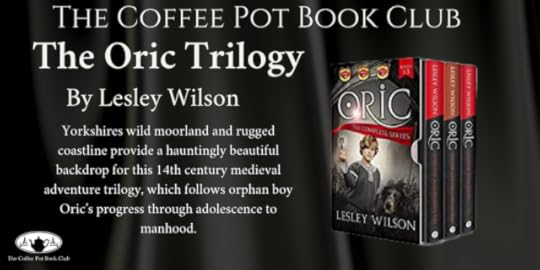
Trials and tribulations of food preparation in the 14th century.By Lesley Wilson
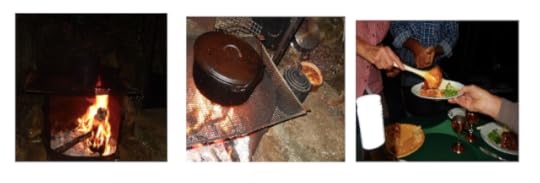
A cast iron pot sits over an open fire, wisps of steam escaping from beneath the lid. Beside it is another smaller pot containing damper, a form of yeast-less bread Australians love to bake on these occasions. The smell of beef stew mingles with the heady perfume of night jasmine and I think myself lucky to be sitting outdoors, on this balmy night, waiting to share a delicious supper with a group of friends. This we do for fun. Not so the Yorkshire folk I write about in my medieval adventure trilogy. For these folk, cooking over an open fire was a necessity. Whatever the season, come rain, hail, or shine, they coped with primitive facilities every day of their lives. As an ex-pat Yorkshire-woman, I can relate to the inclement weather they endured.
Many poor peasants lived outdoors, making do with tree branches covered in bracken for shelter. Food was cooked in the open, using whatever kindling they could beg, borrow, or steal to fuel their fires. Those fortunate enough to afford a roof over their heads, lived in dingy, single-roomed cottages. In winter, they shared these cramped quarters with livestock, the animals’ body-heat helping to keep the family warm. No doubt the smell of unwashed humans, coupled with the odour of fresh animal dung, was woeful.
A waste-not, want-not society, folk utilised every commodity they could lay hands on, including cow dung, dried and mixed with straw, to burn alongside the precious commodity of wood. I wonder what those medieval people would have thought of Aussies, burning cow pats to repel mosquitoes.
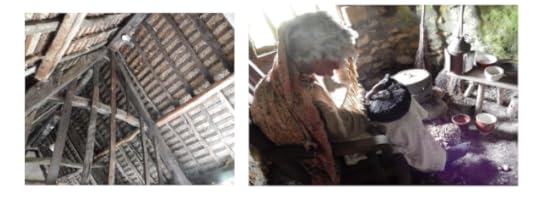
Cottagers’ fires were kept alight on a central hearth inside their dwelling, twenty-four hours a day, but tamped down at nigh to save fuel. As well as providing cooking facilities, the fire supplied heating and lighting. Windows were none existent in peasants’ homes; the only airflow, apart from a specially constructed smoke hole in the roof, came from an open doorway. In cold, wet weather, people were reluctant to open up to the elements, thus enduring smelly, unhealthy conditions. Sparks from the fire often drifted into thatched roofs, setting them alight. To save their homes from burning, folk bucketed water from a nearby stream, or well, to douse the flames.

Medieval housewives favoured three-legged, cast iron cauldrons for cooking. The heavy vessels were thrust directly into the fire or hung from an adjustable hook attached to an overhead beam. Since the women had no quick method to regulate the heat, they needed to keep a wary eye on the pot, to make sure food within didn’t boil dry and burn. Pottages (or stews) were their staple food. Seasonal vegetables, pulses and herbs, along with whatever meat they had, were added to a stock made from boiled bones. As winter approached, food became scarce, and the pottage was watered down until it became near tasteless.
Earthenware containers were pushed in amongst hot ashes around the fire’s perimeter and eggs, regarded as a delicacy, were baked in their shells or cracked directly on to the hot hearth. No doubt a fair amount of soot was consumed.
Goodwives cooked and cleaned, cared for the animals and children. They tended the garden where vegetables were grown for the table. Once a week the local market provided a venue for selling or bartering surplus produce.
Ploughing commenced in early spring followed by the sewing of oats, barley, and wheat across the landowners’ fields. Women and children handled the latter chore. All daylight hours were then spent running around the fields’ perimeter, shouting and banging wooden spoons on pots, to keep greedy birds at bay. Once the crops were harvested, the women could glean what grain was left on the ground. At their lord of the manor’s insistence, medieval housewives paid a miller to have their gleanings ground into flour. Draining financially for the peasants, but a nice little earner for their lord and master. Once the flour was made into dough it was dropped into an iron pot, covered it with a lid, and baked in the fire. Only licensed bakers and wealthy households were allowed ovens, for they consumed tremendous amounts of precious firewood.
Husbands, who were lucky enough to have gainful employment, worked all hours tending their masters’ land. Tools were primitive, and horses pulled ploughs fitted with wooden tynes. It was back breaking work.
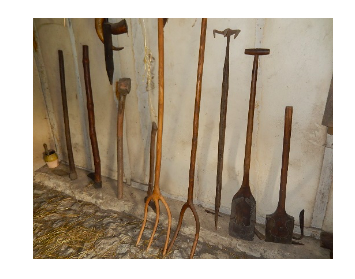
At the end of the year, before winter set in, many cattle were sent for slaughter and salted down to provide food through the cold months of the year. Hunting venison and wild boar was the prerogative of the landowner and, once the animal, whatever it may be, was butchered, the unwanted offal was distributed to the peasants. Pies, bulked out with carrots, turnips, and onions made the offal go further. Snared rabbits and pigeons added extra meat to poor folks’ diets. The landed gentry lived in a medieval version of luxury, and employed servants to shoulder most of the heavy work. They entertained guests in the Great Hall and, to escape unpleasant cooking odours plus the risk of setting the roof on fire, the kitchen was often located in a separate building a short distance away from the main house. A covered walkway kept inclement weather from ruining the food in transit.
This form of transportation reminded me of my school days in the 1950s. At noon each day an elderly gentleman towed a trailer, behind his bicycle, from the kitchens in the junior school, where meals were cooked, to the small senior school a couple of blocks away. Eight large aluminium boxes, submerged in hot water, contained lunch for the high school pupils and their teachers. Innocents that we were, we regarded this method of moving food around the district as state of the art. I suspect our eccentric headmaster, who owned the school, saved money by avoiding the use of external caterers.
Kitchens in wealthy medieval households enjoyed comforts that were not available to the peasant classes. Trestle tables and benches were plentiful, as were pots and culinary implements. Cavernous inglenook fireplaces, usually constructed against an end stone wall, provided substantial cooking facilities.
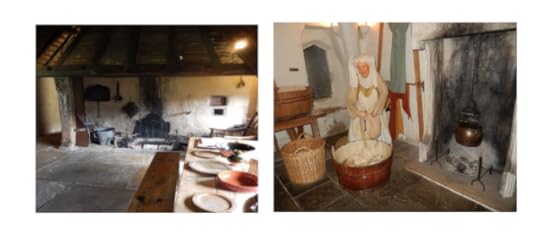
High ranking servants received payment, but lesser serfs often worked for nothing more than their keep and a roof over their heads. Scullions, at the bottom of the pecking order, were expected to turn spits, clean fish, scour pots, and fetch and carry for the senior servants all hours of the day and night. A huge ladle was the cook’s trademark. Used in the cooking process and for serving food, the solid implement also made a handy weapon. Many a poor serf was on the receiving of a hefty clout for committing minor misdemeanours.
Gentry consumed vast quantities of venison, fish, chicken and eggs. Feast days saw a whole pig, impaled on a spit and slow roasted. Scullions, taking turns to wind the spit handle, became mottled and scorched from the fire’s fierce heat. If the embers showed signs of cooling, the lads were expected to resurrect it with the aid of huge bellows. Fuel required for cooking and heating was manhandled into the kitchen and Great Hall by overworked servants. For the less well off, life was hard and unforgiving.

As I tucked into a plate-full of stew and damper on that lovely tropical evening, I gave thanks for being born in the 20th century.
To round off my blog, I have added a passage from Oric and the Alchemist’s Key. Apothecary Ichtheus is enjoying supper with his apprentice, Oric, and friend, Nathaniel, the shepherd, followed by a somewhat unnerving journey home. I hope you enjoy reading it as much as I loved writing it.
Excerpt
A Spooky Night Out.
Ichtheus heated the pigeon stew and spooned generous portions onto three wooden platters. Each fat bird, surrounded by turnips and onions, dripped with delicious gravy. Conversation stilled until the bones were sucked clean. Belching gently, Ichtheus reached for the first bottle of nettle wine. A short time later he opened a second bottle. The imbibers stretched out before the fire, feeling lazy and mellow.
Nathaniel produced a flagon of mead, and mellowness swiftly degenerated into intoxication. “I say Ichtheus!” Nathaniel slurred his words, “Did you hear about that old crone?”
Ichtheus raised his eyebrows drowsily, “What old crone?”
“The one they branded a witch.” Nathaniel paused for effect. “I heard that some half-wit locals dragged the poor old hag from her hovel and carried her to St Griswald’s Church. ‘Tis said they never gave her a chance to defend herself. ‘Tis said the fools built a pyre in the middle of the graveyard and burned her alive.” He shook his head blearily. “What a terrible way to die.”
Outside Nathaniel’s cottage, cold air struck Oric and Ichtheus like a body blow. An icy moon sailed in an ocean of night sky, towing silver clouds in its wake. In a hurry to get back to Bayersby Manor and his warm bed, Ichtheus set a brisk pace.
Oric followed with the dog.
The only member of the trio not staggering was Parzifal.
“What ails you, boy?” Ichtheus slurred. “You will have me fall upon my backside if you continue to run into me like that. Pish! Can you not hold your liquor?”
Oric gave a hiccupping titter. “‘Tis not my fault, Master Ichtheus, ‘tis you that has over imbibed, not I!”
They soldiered on, tripping over each other until St Griswald’s Church loomed into sight. Nathaniel’s talk of witches and ghosts overrode Oric’s good sense, and he hung back. He had guts aplenty for everyday things, but ghosts were another matter altogether.
“What a great booby you are,” chafed Ichtheus, cuffing Oric’s ears affectionately. “Come, we shall sing a song to cheer ourselves.” Without further ado, he launched into his favourite hymn.
Oric joined in half-heartedly. Neither of them had an ear for music, and the noise they made set Parzifal to howling.
Moonlight cast long shadows, creating a black and silver scene. Trees took on sinister shapes, and a sudden breeze made an old yew tree creak. The owl hooted from his perch in the bell-tower, causing Oric’s neck hairs to stand on end.
An urge to relieve himself overtook Ichtheus. While he fumbled with all his extra clothing, Oric and Parzifal sloped off around a bend in the pathway. Ichtheus was in full stream when the pair reappeared, running as if chased by demons. Oric crashed into his master and bowled him over. Unable to turn off his tap in time, Ichtheus pissed copiously into one of his boots.
“Damn your eyes, boy!” Ichtheus staggered to his feet, “What in heaven’s name are you about?” He shook his foot. “You blithering fool … look what you have caused me to do.” He set his wet boot on the ground and was disgusted to hear it squelch.
Oric’s voice rose from hoarse whispers to high squeaks of sheer terror. He grabbed Ichtheus by the arms. “Master! Master! I saw it. Her! The thing!”
“What thing, boy? What THING?” Ichtheus shouted and shook Oric as if he were a rag doll.
“The witch! You remember! The one we talked about with Nathaniel. That old hag that was burned! I saw her around the corner,” Oric pointed a shaking finger. “She is there, I tell you. All of a quiver and a dither, she smiled and beckoned to me.”
“What rubbish, boy!” Filled with nettle wine, mead, and bravado, Ichtheus strode down the path to investigate.
Parzifal loped alongside, rumbling with growls. Feeling less brave by the minute, Ichtheus rounded the bole of a giant oak-tree.
“Oh, my sainted aunt!” he gasped, his bravado deflated like a pig’s bladder pricked by a dagger. He seized Parzifal’s collar and huddled into the oak’s dark shadow. Summoning every ounce of his courage, he took another peek around the tree trunk.
Not more than twenty strides away an old woman sat upon a rickety cart. She dithered and beckoned, just as Oric had described. Something was in the trees, too. Pallid, disembodied faces floated about as if imbued with a life of their own.
Prickled from head to foot with gooseflesh, Ichtheus lost his nerve. He turned and fled on liquid legs towards the churchyard gate. Parzifal chased after his master. Now horribly sober, Ichtheus stopped at the gate to make sure the apparitions did not follow. He tried to catch his breath and slow his racing heart. It would never do to let Oric see him in this state. Oh, dear, no! The lad would never allow him to live it down.
Oric was hiding in a ditch.
“Get out of there, boy! There is nothing to be afraid of,” Ichtheus bluffed in his boldest voice. “The ghost you saw is naught but a trick of the moonlight. However, to spare you further distress, we shall traverse the churchyard’s outer wall instead of cutting across the middle.”
The sight of his master’s rigid face stilled Oric’s tongue, but he did not believe a word Ichtheus said.
They galloped around the churchyard’s perimeter. Only when they had gained the cover of the overgrown footpath did they slow their pace. Not a word passed between them until they arrived back at Bayersby Manor.
Still shaken, Oric bid his master a subdued goodnight and crawled, fully clothed, into his inglenook corner.
Ichtheus removed his boots and dropped thankfully onto his truckle bed, but he took a long time to fall asleep.
The Oric TrilogyThe Complete series Book 1 - 3By Lesley Wilson

Returning to the manor after an early morning foraging errand, Oric finds his home alight, the inhabitants dead, and his mentor mortally wounded. The old man relinquishes a key, warning Oric that a terrible disaster will surely occur should it fall into wrong hands. The alchemist also hints of great wealth, but he dies before he can impart any further information.
In his quest to unravel the mystery surrounding the alchemist’s key, Oric experiences many challenging adventures before a surprising and lifechanging conclusion is reached.
Pick up your copy ofThe Oric TrilogyAmazon
Lesley Wilson
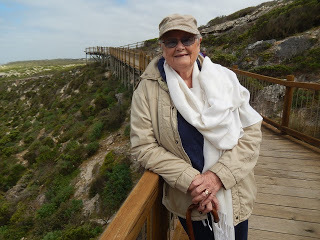 Born in North Yorkshire, Lesley Wilson was inspired to write stories at an early age. She turned her father’s garage into a theatre and produced juvenile dramas. Local kids who watched her shows were expected to donate a penny to the RSPCA.
Born in North Yorkshire, Lesley Wilson was inspired to write stories at an early age. She turned her father’s garage into a theatre and produced juvenile dramas. Local kids who watched her shows were expected to donate a penny to the RSPCA.In her early teens, Lesley joined an amateur theatre company and took part in many productions.
On a train trip to Italy in 1957, Lesley met a young man. A whirlwind courtship followed before he joined the British Army. Fifteen months and hundreds of letters later, Lesley, aged seventeen, boarded a troop ship bound for Singapore, where she married the love of her life.
Lesley’s careers have included fashion modeling, market research and running her own business but writing has always been her true passion. She completed a course in Creative Writing and Journalism with the London School of Writing and has been an active member of a writers’ group.
She now lives with her husband in North Queensland, and enjoys frequent visits by her two teenage grandchildren. When Lesley isn’t writing, she loves to read, entertain friends, and travel.
Connect with Lesley: Website • Newsletter • Facebook • Twitter • Instagram • Goodreads.
Published on April 06, 2020 20:00
April 5, 2020
#BookReview — Waltz in Swing Time by Jill Caugherty #HistoricalFiction #NewRelease @JillCaugherty
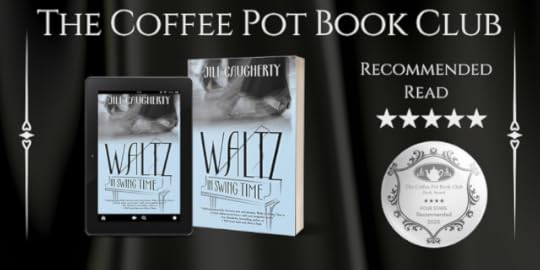
Waltz in Swing TimeBy Jill Caugherty
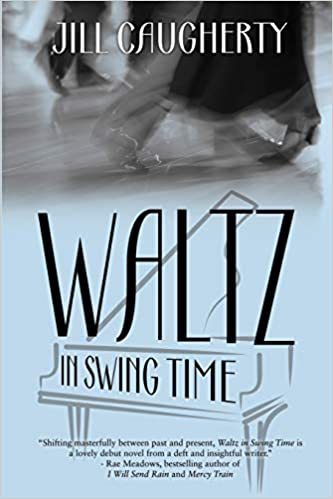
Growing up in a strict Utah farm family during the Depression, Irene Larsen copes with her family’s hardship by playing piano. Even when an unthinkable tragedy strikes, Irene clings to her dream of becoming a musician. When a neighbor's farm is foreclosed, Irene's brother marries the neighbor's daughter, who moves in with the Larsens and coaches Irene into winning leading roles in musicals. Clashing with her mother, who dismisses her ambition as a waste of time, Irene leaves home.During a summer job at Zion National Park, she meets professional dancer Spike, a maverick who might be her ticket to a musical career. But does pursuing her dream justify its steep price?Alternating between Irene’s ninetieth year in 2006 and her coming-of-age in the thirties, Waltz in Swing Time is a poignant tale of mother-daughter relationships, finding hope amidst loss, and forging an independent path.

"I never chose to spend my final days in a Disney Land for seniors."
Irene Stallings may well have one foot in the grave, but she was still humming. Did they not understand? It was just her body that was failing?
Irene could not deny that the Golden Manor was beautiful with its cathedral-style windows and potted plants. And of course, there was bridge night, craft days, and best of all there were people her own age for her to talk too! Sometimes there was even a pianist who played the old favourites. What more could she possibly want?
Irene would tell them if they let her. She wanted Harold. She wanted his stupid jokes and for him to take her in his arms like he used to. And she wanted to pirouette across a stage before an audience. She wanted the colour, and the music, and the jazz, and the dance.
Irene knows what they think. They think she is losing her mind. All those hours spent outside in the courtyard talking to herself does indeed look suspicious, but what they fail to notice is the tape player in her hand. Irene is not talking to herself. She is leaving a legacy for the only person who would understand.
While those around Irene get ready to celebrate her 90th birthday, Irene allows her mind to escape back to 1930s Utah, where it all began...
From a wheat farm in the community of Paradise, Utah, to the blessed relief of a longed-for sleep, Waltz in Swing Time by Jill Caugherty is the utterly enthralling story of one woman who dared to risk it all and follow her heart.
The strong foreshadowing at the opening of this novel hints this tale will be an especially tragic one. Death is a foregone conclusion when a book is set in a home for the elderly, but the enormous dragon in the room which no one dares to talk about is as loud as an empty space where a piano once stood. I realised from the opening chapter that Waltz in Swing Time was going to demand every conceivable emotion from the reader. Still, nothing prepared me for how much of an emotional roller-coaster I had unwittingly found myself riding. I laughed, I cried, I wanted to scream at the injustice, and I had only just finished Chapter 4!
The story itself fluctuates between loud crescendos that then tapers into a sorrowful diminuendo. Of course, there are also moments in this book where the pianist abruptly stops playing, gets up, slams the piano lid down and storms out the room while the reader is left gasping and wondering what on earth just happened. This constant change in dynamics and time signatures is what made this book so very entertaining and immensely successful. The pages practically turn themselves — I was wholly bewitched with this symphony of colourful sights and sounds.
This book is told in the first person from Irene's point of view, but she does pay homage, as she dictates her memoirs into a microphone, to some of the people who were so very influential in her life. Wylie, for example, is only mentioned a dozen times. Still, he is instrumental in showing Irene that she could change her stars and could get an education, which bucks the convention of the ideas a woman perhaps aspired to in the 1930s. Irene also has first-hand knowledge of what her life will be like if she were to settle down and marry at a young age. Irene goes from admiring and being somewhat jealous of Mae, a schoolfriend and neighbour, to pitying her when Irene realises the sacrifice she had made by marrying. Mae is a fabulous singer, but she no longer has the time for such trifle enjoyments, and as the music leaves Mae, she loses that sparkle that once made her shine brighter than a star. Irene is determined not to let what happened to Mae, happen to her.
I adored Irene. She is the kind of heroine that you cannot help but love. She is spirited, courageous and funny. She is talented, quick and ambitious. Irene knows what she wants, and nothing will stop her — not her friends, not her parents, nor her boyfriend. I really admired Irene for her tenacious determination to become the woman she wants to become despite the considerable opposition that she faces. Her mother does not want her to leave the farm. She wants Irene to settle down and get married. Irene's father is somewhat bemused by his daughter's ambition but indulges her, as father's often do. It isn't until Irene meets Spike that she realises that this is the young man who she was holding out for, but even then, she does not give up on her dreams. I thought Caugherty's depiction of Irene was simply marvellous.
And then there was Spike! Oh, my goodness! Caugherty has gifted her readers with a larger-than-life character who is not only an incredible dancer and a notorious flirt, but he is also filled with ambition. Like Irene, he comes from nothing and yet that does not stop him from carving out the life he wants. I adored everything about his characterisation — he is so much fun and so full of life — one could not help but like him.
Caugherty explores the agonies of death and the consequences of it in this book in great detail. Indeed, at times, death leads the narrative. Irene's relationship with her mother deteriorates very rapidly because of a death, and they lose each other because of the subsequent grief that her mother drowns in. The person Mrs Laresen becomes is a shadow of who she really is. All that Mrs Laresen has left is cold bitterness and contempt, which is incredibly tragic in itself but more so when she has nowhere to tunnel that bitterness. Unfortunately, she ends up throwing it at Irene. As I read this book, I could not help but wonder if Mrs Laresen saw the image of her younger self in Irene, and she did not like to see the reminder. Irene is full of dreams and ambition, and her soul is filled with music. Mrs Laurence's dreams were buried six feet under.
The mother-daughter relationship is a theme that is explored in great lengths during this novel. There are moments when Irene realises she is watching history repeat itself — Irene's daughter, Deirdre, is very similar in personality to her grandmother. Deidre is a very controlling and opinionated woman who likes to take charge, be in control. Deidre is a complete contrast to her mother but also her own daughter, Amy. Like, Irene, Amy will live her life the way she thinks she should and not the way her mother wants her to. Ironically, while Deirdre is telling her grown-up daughter how to live her life, she conveniently forgets that she refused to live the life her father wanted her to live as well. Irene watches all of this with an almost amused detachment. She loves both her daughter and granddaughter, and she knows that it will somehow all work out for the best.
The historical detailing in this book has to be commended. Caugherty has captured the very essence of what life would have been like on a wheat farm in Utah during the Great Depression of the 1930s. To watch as everything you have worked for is destroyed must have been utterly soul-destroying. This was a terrible time in American history which Caugherty has depicted with great skill and diligence. Kudos, Ms Caugherty.
I was blown away by this debut novel. I could have read a thousand pages more, and I still would not have had enough of this story and these characters. I loved every word, every sentence, every syllable. I was captivated from the opening sentence to that final full stop. Waltz in Swing Time by Jill Caugherty is an absolute triumph. I Highly Recommend. Review by Mary Anne Yarde.The Coffee Pot Book Club.
Pick up your copy ofWaltz in Swing TimeAmazon UK • Amazon US
Jill Caugherty
 Jill Caugherty is the author of the novel WALTZ IN SWING TIME, set in Depression-era Utah.
Jill Caugherty is the author of the novel WALTZ IN SWING TIME, set in Depression-era Utah.Jill’s short stories have been published in 805Lit and Oyster River Pages, and her debut short story, “Real People,” was nominated for the 2019 PEN/Robert J. Dau Short Story Prize for Emerging Writers.
Jill holds a B.S. in Computer Science from Stanford University, an M.S. in Computer Science from Rensselaer Polytechnic Institute, and an MBA with honors from the University of North Carolina at Chapel Hill Kenan-Flagler Business School.
An award-winning marketing manager with over twenty-five years of experience in the high tech industry, she lives in Raleigh, North Carolina with her husband and daughter. Connect with Jill: Website • Twitter • Goodreads.
Published on April 05, 2020 21:30
Check out Diana Jackson's fabulous book — Missing: Past and Present #HistoricalFiction @Riduna
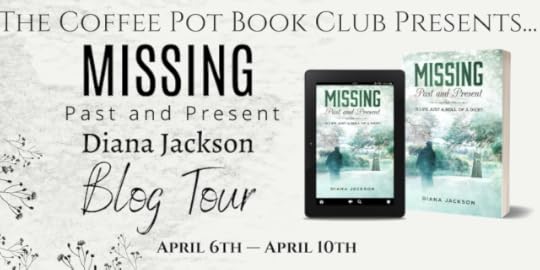
Missing: Past and PresentBy Diana Jackson
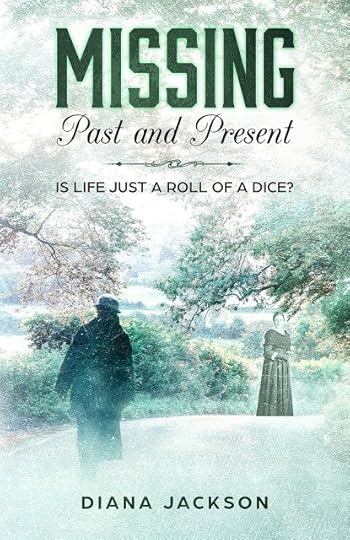
Following the mysterious disappearance of her husband, Dorothy Gibbons, affectionately known as Lady Pink Hat, trudged the lanes around Drumford, homeless and directionless. Alone, she rolled a dice, reflecting on her life, times both painful and pleasant. She stumbled upon The Grange, which changed the course of her life. In her isolation and surrounded by old books Dorothy began to write ...
An 18th Century aspirant nun, Millie, ran away from The Grange ...
Jamal Hussain, a Syrian refugee and asylum seeker, was fostered under the careful wing of Dorothy until leaving school and finding work. He and his brother settled in a nearby flat until the misguided Ahmed Hussain also disappeared.
With three missing people, who will discover the truth? Is it Millie who is still haunting The Grange until her story is told?
Pick up your copy of
Missing: Past and Present
Amazon
Diana Jackson
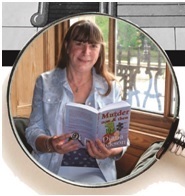 After six years in the wilderness, (wandering the Fife Coastal Path and finding her way back to writing, to be precise!) author Diana Jackson is about to launch the second novel in her Mystery Inspired by History series. A retired teacher of sixty one years, Diana Jackson has published five works since 2009. Her first, historical romantic fiction, Riduna, set in the Victorian era, was published by Pegasus Elliot Mc Kenzie in 2009 but was re-launched by Eventispress in 2012 - a writer’s indie collaborative publisher, through which all her other works have been published:
After six years in the wilderness, (wandering the Fife Coastal Path and finding her way back to writing, to be precise!) author Diana Jackson is about to launch the second novel in her Mystery Inspired by History series. A retired teacher of sixty one years, Diana Jackson has published five works since 2009. Her first, historical romantic fiction, Riduna, set in the Victorian era, was published by Pegasus Elliot Mc Kenzie in 2009 but was re-launched by Eventispress in 2012 - a writer’s indie collaborative publisher, through which all her other works have been published:2012 Ancasta, Guide me Swiftly Home ~ Riduna’s sequel
2013 The Life and Demise of Norman Campbell ~ a memoir
2014 Murder Now and Then ~ a mystery set in two time zones, 1919 and 2019
2017 The Healing Paths of Fife ~ a personal fantasy memoir
After moving to Fife from Bedfordshire in 2014 Diana has had a break from her life as an author to settle into her new life within the Kinghorn Community. The Healing Paths of Fife tells of that journey. Rejuvenated, she finally turned to finishing MISSING, Past and Present.
Diana writes, ‘This novel is special to me because it is influenced, in part, by my experience volunteering in a soup kitchen in Bedfordshire and also at a local food-bank here in Fife. My experience as a course team leader and personal tutor at a College of Further Education in the heart of Luton and a teacher of English as a Second Language is also reflected, where I gained valuable insights into social issues and difficulties some young people of today face.
Connect with Diana: Website • Blog • Twitter • Facebook
Published on April 05, 2020 21:00
Check out #HistoricalFiction author, Pam Lecky's, fabulous new book — Footprints in the Sand (The Lucy Lawrence Mysteries, Book 2) #NewRelease @pamlecky

Footprints in the Sand(The Lucy Lawrence Mysteries, Book 2)By Pam Lecky
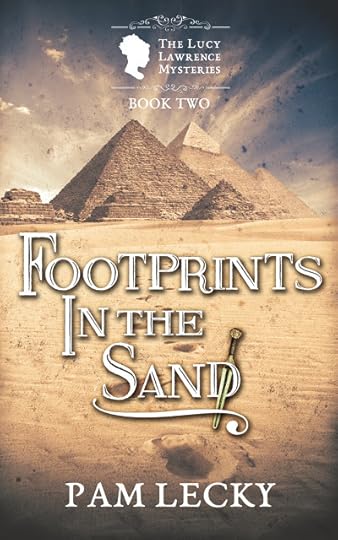
Cairo 1887.
A melting pot of jealousy, lust and revenge. Who will pay the ultimate price?
Lucy Lawrence throws caution to the wind and embarks on a journey of self-discovery to the land of the pharaohs.
Travelling to Cairo as the patron of the charming French Egyptologist, Armand Moreau, Lucy discovers an archaeological community plagued by professional rivalries and intrigue. It is soon apparent that the thriving black market in antiquities threatens Egypt’s precious heritage.
When the Egyptian Museum is burgled, Lucy is determined to solve the case, much to the annoyance of the local inspector of police, and the alarm of Mary, her maid. But when an archaeologist is found murdered in the Great Pyramid, Lucy is catapulted into the resulting maelstrom. Can she keep her wits about her to avoid meeting a similar fate?
Excerpt
The Shubra Avenue, North Cairo, that Afternoon.
The lightly sprung open carriage bowled along the broad avenue beneath the sycamores and lebbeks which formed a cool green tunnel of shade. Much to Lucy’s surprise, it was far more crowded than she had expected. Whether carriages or the ubiquitous donkey, every mode of transport had been employed, and half of Cairo appeared to have had the same idea of an afternoon drive.
“It is just like Rotten Row in Hyde Park,” Lucy remarked to Mary. “I understand it is a favourite haunt of the tourists. Rafiq told me it is the place to be seen, particularly on Fridays and Sundays. Even the khedive likes to take the air here. Oh look, Mary,” she said as a carriage passed by with a veiled lady inside. “I wonder if she is from one of the harems.” Lucy raised her parasol, trying to catch another glimpse.
“What’s a harem?” Mary frowned at her. Lucy quickly explained.
“Good gracious! It is all wonderfully exotic, ma’am. I’m not sure me mother would approve.”
Lucy snorted. “Or Father O’Brien?”
“Oh lord, ma’am, it would kill him entirely!”
“Best not tell them so, Mary. Stick to snakes and scorpions and your impossible mistress.”
Mary gave an exaggerated shiver. “I don’t know how you can joke about those creatures, ma’am. Cairo and Egypt suit you, but I’d rather be at home.”
“I’m sorry you feel that way, Mary, but it’s only for a few months, and you’ll soon be back with your Ned.” This brought a smile to Mary’s face. Lucy continued: “Perhaps I fit in here because I am in my natural habitat. I am among rogues, charlatans, thieves and chancers. The most fascinating group of people I have ever encountered.”
“Ah, ma’am. I know you are joking. You are none of those things. However, I’ve no doubt you will sort each and every one of them out if you can.”
Lucy replied with a smile. “I shall try. It would appear we are all stuck here in Cairo for the present, and I need something to keep me occupied.”
“That’s a shame, ma’am. I know how much you liked the desert. What do you have in mind?”
“I think a little detecting may be in order.”
Mary blanched. “But look what happened the last time! Best not.”
“But, Mary, the theft at the museum has not been solved. Nor my middle of the night visitor, though I think that one is best left to the police. However, there is something very peculiar about the burglary at the museum, and it is niggling away at me. Why did they not take the opportunity to steal more than a handful of items? It does not make sense.”
Mary shrugged. “It’s a very poor country. People do what they need to do to survive and feed their families. Perhaps the burglar realised what he had was priceless and was happy enough, or was disturbed and made a run for it?”
“Hmm, well, I am not convinced. Something about it does not feel right.”
“I’d leave it alone, ma’am. How could you possibly solve it? And those thieves may be highly dangerous. They will not take kindly to you poking your nose in.”
Lucy gasped. “Poking my nose in!”
“Sorry, ma’am, but yes. Let the police do their job,” Mary replied with a stern gaze. “They probably suspect who did it and only need to catch them trying to sell the items to a dealer.”
Lucy narrowed her eyes. “You seem to know a lot about how these things work.”
Mary sniffed. “I hear the talk amongst the other servants, ma’am, at the hotel.” She leaned forward. “I think one or two of them might be trying their hand in the black market. Very lucrative, from what I hear. Some of them plan to bring items home to sell on.”
“Indeed. That’s interesting, Mary. Keep your ears open, and let me know if you hear anything else. Just think, we might try to crack it, just the two of us. It would be such fun.”
Mary didn’t look convinced. “Fun, is it? And what about me, when I have to return to England and explain to your grieving family and friends that your nasty death was down to fun?”
“It won’t come to that. Don’t I have you to watch out for me?”
Mary rolled her eyes skyward.
“You know if I get bored, I will only make your life miserable. Come, what do you say, Mary? It won’t be too difficult. I already know where to find one rogue who deals in stolen goods—the fellow who tried to sell me the mummy’s hand. All I need to do is question him and try to trace his source. He was a slimy fellow. I’m sure for the right amount of money he would give us some names or useful information.”
Mary sniffed. “More likely, a passport to heaven, ma’am!”
Pick up your copy ofFootprints in the SandAmazon
Pam Lecky
 Pam Lecky is an Irish historical fiction author, writing crime, mystery, romance and the supernatural. Pam is represented by the Hardman & Swainson Literary Agency in London. She is a member of the Historical Novel Society and the Society of Authors and has a particular love of the late Victorian era/early 20thCentury. Her debut novel, The Bowes Inheritance, was awarded the B.R.A.G Medallion; shortlisted for the Carousel Aware Prize 2016; and long-listed for the Historical Novel Society 2016 Indie Award. Her short stories are available in an anthology, entitled Past Imperfect, which was published in April 2018. June 2019, saw the release of the first book in the Lucy Lawrence Mystery series, No Stone Unturned, a fast-paced Victorian mystery/crime, set in London and Yorkshire which was recently awarded the B.R.A.G. Medallion. The sequel, Footprints in the Sand was released on 14th March 2020.\
Pam Lecky is an Irish historical fiction author, writing crime, mystery, romance and the supernatural. Pam is represented by the Hardman & Swainson Literary Agency in London. She is a member of the Historical Novel Society and the Society of Authors and has a particular love of the late Victorian era/early 20thCentury. Her debut novel, The Bowes Inheritance, was awarded the B.R.A.G Medallion; shortlisted for the Carousel Aware Prize 2016; and long-listed for the Historical Novel Society 2016 Indie Award. Her short stories are available in an anthology, entitled Past Imperfect, which was published in April 2018. June 2019, saw the release of the first book in the Lucy Lawrence Mystery series, No Stone Unturned, a fast-paced Victorian mystery/crime, set in London and Yorkshire which was recently awarded the B.R.A.G. Medallion. The sequel, Footprints in the Sand was released on 14th March 2020.\Connect with Pam: Amazon, Facebook, Twitter, www.pamlecky.com, Instagram and Goodreads .
Published on April 05, 2020 20:00
Are you looking for a safe and legitimate way to gain interest and reviews for your Book? Let's talk about #NetGalley @LPOBryan

Let's Talk About NetGalley
 Are you looking for a safe and legitimate way to gain interest and reviews for your Book?
Are you looking for a safe and legitimate way to gain interest and reviews for your Book?Would you like to get your Book in front of Professional Reviewers?
Would you like to use a service that is used by all the major publishing houses?
If so, NetGalley may be the answer.
What is NetGalley?
In their own words:
"NetGalley is a platform that allows publishers to put their books in front of readers of influence. Over 380,000 registered members use the site to find titles to review, books to stock in their stores or libraries, add to educational reading lists or cover in their media activities. If approved to access the title, members can download it securely to any major reading device, and as all files are protected, your content cannot be shared or disseminated. It’s the perfect way to amplify the interest in your titles before, during and after publication."
I have secured a massive 25% discount with Books Go Social's, already very reasonable, NetGalley Promotional Package. This discount makes it very affordable for you to get your book onto NetGalley and in front of those 380,000 registered members.
I would not try to sell you something that I did not believe in. I have used NetGalley, and it allowed me to connect with the most wonderful book bloggers, many of whom are now part of my launch team. For me, it was certainly worth the money.
NetGalley is the #1 service in the world for getting reviews on Amazon — many of the reviewers are Amazon Top Reviewers as well as being influential bloggers.
Who are Books Go Social?

Books Go Social (BGS) is a highly respected Author Promotion service — you may have already heard of them. The founder of BGS, Laurence O’ Bryan is dedicated to helping authors showcase their books. He knows what works and what does not. This is why I am so excited to be working with him on this fantastic deal.
This offer is only available for a very LIMITED TIME. With the 25% discount, this is one of the cheapest ways you can get your book in front of those influential NetGalley Professional Readers.
To get your 25% discount click on:
Books Go Social NetGalley Promotion
and type:
may25
at the checkout.
If you have any questions, then don’t hesitate to ask.
*NetGalley does not restrict to positive only reviews.
Published on April 05, 2020 19:30
April 4, 2020
Become a Blog Tour Host with The Coffee Pot Book Club #BlogTours #HistoricalFiction #BookPromotion
Do you love Blogging and talking about Historical Fiction?

The Coffee Pot Book Club is looking for Historical Fiction bloggers just like you to become blog hosts for our tours.
If you like to read, review or simply talk about Historical Fiction on your blog, then why not become a blog host for The Coffee Pot Book Club?
Benefits:
· You will meet some fabulous authors and their books.· You will have a chance to read and review some wonderful books.· You will be part of a team of like-minded individuals (who all love Historical Fiction).· *If you are a Historical Fiction author and are also a Coffee Pot Tour Host, you will receive 20% of the prices of the Coffee Pot Tours.· You will receive a really cool Coffee Pot Tour Host badge to add to the sidebar of your blog.
If you are interested in becoming a tour host or would like more information, then please contact Mary Ann:
author@maryanneyarde.com
* Terms and Conditions apply.


The Coffee Pot Book Club is looking for Historical Fiction bloggers just like you to become blog hosts for our tours.
If you like to read, review or simply talk about Historical Fiction on your blog, then why not become a blog host for The Coffee Pot Book Club?
Benefits:
· You will meet some fabulous authors and their books.· You will have a chance to read and review some wonderful books.· You will be part of a team of like-minded individuals (who all love Historical Fiction).· *If you are a Historical Fiction author and are also a Coffee Pot Tour Host, you will receive 20% of the prices of the Coffee Pot Tours.· You will receive a really cool Coffee Pot Tour Host badge to add to the sidebar of your blog.
If you are interested in becoming a tour host or would like more information, then please contact Mary Ann:
author@maryanneyarde.com
* Terms and Conditions apply.

Published on April 04, 2020 08:39
April 2, 2020
Check out Nina Romano's fabulous book — The Girl Who Loved Cayo Bradley #Western #Romance @ninsthewriter

The Girl Who Loved Cayo BradleyBy Nina Romano

When Darby McPhee falls in love with Cayo Bradley, a wild cowboy from a nearby ranch, her world is ripped apart. Caught in a lifeless existence of caring for her father and brothers since her mother’s death, Darby does little else but work. But a death-bed promise to her mother to get her education now stands in the way of her heart’s desire to belong to the rough-and-tumble Cayo Bradley.Darby is Cayo’s redemption from a horrific act in his past that torments him. After being captured as a young boy by the Jicarilla Apache, he now tries to settle back into white society—but how can he? If he loses Darby, he loses everything.
Darby is determined to keep her promise to her mother, but will Cayo wait for her? In this stunning tale of love and loss, Darby comes to understand that no matter what happens, she will always be THE GIRL WHO LOVED CAYO BRADLEY…
Praise for The Girl Who Loved Cayo Bradley
Romano’s story sizzles with the tension of lovers—one struggling to blend Apache ways and white, the other torn between East and West—searching for a way to join two lives going in opposite directions.Ruth Hull Chatlien, Blood Moon, and The Ambitious Madame Bonaparte
The Girl Who Loved Cayo Bradley, a superbly crafted romantic page-turner, is a deftly spun tale of ill-starred sweethearts in the American West. Darby, a charming farm girl, and Cayo, Apache raised, a secretive man with a disturbing past. Sparks ignite, burning intensely despite cruel circumstances to separate them—an expertly woven story with witty dialogue, fast-paced plot, and stunning, enchanting prose! Michelle Cox, award-winning author of the Henrietta and Inspector Howard series.
Excerpt
He knew people saw him as part Apache. Others claimed he was left for dead by bandoleros, and because of his aloof and stealth disposition, and the fact that he was shy and non-confrontational like the animal, people believed that’s how he came to be named Coyote. Somewhere along the way, Coyote’s nickname became Cayo. He didn’t care what people called him as long as they did, and for sure he knew his name didn’t matter because he’d never fit in anywhere. Once you’ve lived wild and free, it’s near impossible to return wholly capable of fitting into refined society. He knew others like himself, children who had been taken and lived with Kiowa or other tribes, and what he saw in them he knew was the same for him. They were the same outcast breed he was, not a trace of Indian blood, but Indian in the way they thought. He’d never completely forgotten his own language, English, so when he finally decided to go back to living the white folks’ way, he listened to speech, carefully repeated words, and held himself close, like a gambler in a poker game, keeping his cards to his chest. He shouldered these thoughts about himself and that other life he lived before as a yoke on an ox. It weighed on him, but he could do nothing to shirk it.
Nobody in town knew him by any other name. Whatever his component parts were, it was for certain he was known as a man quick with a Bowie knife, swifter with a whip. That was because nobody had ever seen him shoot a deadly arrow. He wore chaps every day but Saturday when he drove the buckboard. Cayo carried two Colt pistols in his holsters and never rode his horse without a Winchester 30/30 rifle strapped to his saddle. He was a man people respected, a man who kept his mouth shut and eyes peeled, even the eyes they said he had in the back of his head.
Pick up your copy ofThe Girl Who Loved Cayo BradleyAmazon
Nina Romano
 Nina Romano earned a B.S. from Ithaca College, an M.A. from Adelphi University and a B.A. and an M.F.A. in Creative Writing from FIU. A world traveler and lover of history, she lived in Rome, Italy, for twenty years, and is fluent in Italian and Spanish. She has authored a short story collection, The Other Side of the Gates, and has published five poetry collections and two poetry chapbooks with independent publishers. She co-authored a nonfiction book: Writing in a Changing World. Romano has been nominated twice for the Pushcart Prize in Poetry.
Nina Romano earned a B.S. from Ithaca College, an M.A. from Adelphi University and a B.A. and an M.F.A. in Creative Writing from FIU. A world traveler and lover of history, she lived in Rome, Italy, for twenty years, and is fluent in Italian and Spanish. She has authored a short story collection, The Other Side of the Gates, and has published five poetry collections and two poetry chapbooks with independent publishers. She co-authored a nonfiction book: Writing in a Changing World. Romano has been nominated twice for the Pushcart Prize in Poetry.Nina Romano’s historical Wayfarer Trilogy has been published from Turner Publishing. The Secret Language of Women, Book #1, was a Foreword Reviews Book Award Finalist and Gold Medal winner of the Independent Publisher’s 2016 IPPY Book Award. Lemon Blossoms, Book # 2, was a Foreword Reviews Book Award Finalist, and In America, Book #3, was a finalist in Chanticleer Media’s Chatelaine Book Awards.
Her short story: “Dreaming of a Christmas Kiss,”along with two Christmas poems, have been included in a Christmas anthology, Annie Acorn’s Christmas Treasury Volume 8.
Her latest novel, The Girl Who Loved Cayo Bradley, a Western Historical Romance, has been released from Prairie Rose Publications, and is a semifinalist for the Laramie Book Awards.
THE WAYFARER TRILOGY NOVELS
The Secret Language of Women Amazon
Lemon Blossoms Amazon
In America Amazon
Connect with Nina: Amazon Author Page • Goodreads • Twitter • Facebook.
Published on April 02, 2020 21:00
#BookReview — The Rooming House Diaries - Life, Love & Secrets by Bill Mathis. #HistoricalFiction #LGBTQ @billmathiswrit1

The Rooming House Diaries - Life, Love & Secrets By Bill Mathis
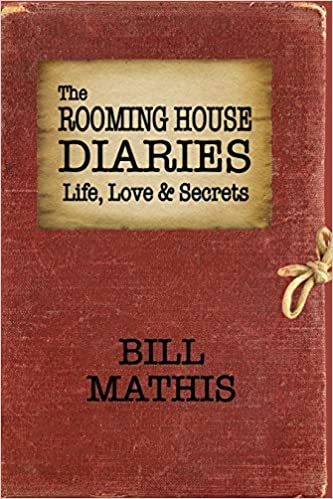
Six diaries and some correspondence are found in an old Chicago rooming house. The diaries span the 20th century. Written by the immigrants who built the place in 1887, their children and several roomers, they tell the stories of everyday people struggling, surviving and succeeding at life amidst the historical backdrop of World Wars I & II, the Great Depression, prejudice, demographic changes in the Back-of-the-Yards neighborhood, and epidemics, including AIDS. It's rich, deep, at times raw, yet shows the humanity, spirit and love of family, both blood related and non-DNA.
It's a novel of changing times and attitudes; family secrets covered up for over one hundred years; religious, ethnic and gender prejudice; the changes in Chicago, a neighborhood and our nation; the joys of diversity and the richness of our society, warts and all

"So, now we got us an eighteen-year-old Mexican from Tiawano and an albino banker from Roseland living on the third floor..."
Josef Sawicki knows that his time on earth is coming to an end. But before he dies, he wants to pen his memoirs so that his story will not be forgotten. What the old man did not realise was that he had started a tradition that would go on for three generations. This is the story of the Sawicki family and the Rooming House that was their business and their home.
The Rooming House Diaries - Life, Love & Secrets by Bill Mathis is an emotionally charged story of a seemingly inconsequential rooming house and the people that lived there. With a sweeping, yet intimate narrative — composed of a memoir, diary entries and letters — and a crystalline understanding of what makes reading entertaining, Mathis has presented his readers with a book that is as mesmerising as it is powerful. This novel spans three generations and over one hundred years of history — it begins in a small village in Olsztyn, Poland (East Prussia) and ends with the AIDS Crisis of the 1980s. In the pages of this remarkable book, Mathis has penned a story that is as lucid in the telling as it is rich in the historical detail. Mathis takes his readers on a poignant journey of discovery and has written an unputdownable tale.
Six fabulous protagonists tell the story of The Rooming House, but I am just going to focus on two of them as well as one of the secondary characters. The first protagonist I want to talk about is a wonderful lady called Mae Sawicki. Mae married Hank, the son of the original owner of the Rooming House. Mae was like a fresh of breath air on a hot summer’s day. She was immensely likeable, full of good humour and a character that was an absolute pleasure to read about. Mae does face several trials and tribulations throughout this book, but her sense of joy and her love for her family is never diminished. The one thing I really liked about Mae was how she saw the world. She becomes very liberal in her views, especially when she is a very old woman, and in the end, she doesn't seem to care where you are from, and what your story is, all she is interested in is who you are now. With this approach to life, it is very easy to understand how she becomes a motherlike figure to several lodgers, for she is filled with tenderness and compassion. Sometimes she takes a little while to like and trust, but when she does, then there is nothing she would not do. She is the truest of friends. Mae is an incredible heroine.
My absolute favourite character in this book is a young Mexican called Manny Rodriguea. Manny's back story is incredibly moving — it is one of poverty, physical abuse and prostitution. Manny, however, is one of the most complex, and the most caring character in this book. He is this wonderful young man who is desperately trying to escape his past and start again. Being a Mexican in Chicago in the 1960s is a challenge — being gay makes it twice as hard. I adored everything about this character. He is the most caring and compassionate man who anyone would be proud to call a son, but whose own father fails to see the gem that Manny is. Despite a very dubious background, Manny is a very reserved young man, which more than likely saves his life. He ends up helping those who have AIDs die with dignity and respect. Manny is a character that will stay with me for a very long time.
Tommy is a source of violence and danger in this book, and although he is not one of the main characters, I feel I have to spend a little time scrutinising his depiction. Even from a toddler, Tommy is a threatening menace. He is uncontrollably violent, and his parents have no idea how to handle him — and it is not because they are bad parents, or that they are doing something wrong. In today's society, Tommy would have been under a paediatrician for his mental health — he shows signs of extreme Pathological Demand Avoidance (PDA). Back in the late 1940s, children's mental health and disorders such as autism were only just being recognised, and it wasn't really understood. To write about a child who has an extremely violent mental health condition such as this, but then to express it so vividly and in a historical setting would, I think, be a challenge for many very experienced authors. Mathis' depiction of Tommy was staggeringly realistic.
Tommy is a character that will not attract sympathy from a reader, and I don't think Mathis wanted to make his readers sympathise with him. Tommy has very few redeemable qualities. He is excessively violent. He is narcissistic — he takes no responsibilities for his actions and blames his parents, particularly his father, for everything. He also becomes a violent sexual predator at a very young age. There are scenes in this book where Tommy is sexually abusing a younger child which was incredibly difficult in the reading, and it did make me feel physically sick. But what I was fascinated in was how, when discovered, this sexual abuse was dealt with. There were no therapists for either child and instead, Tommy is sent away to a boy's home because his parents do not know how to deal with him. The guilt that Tommy's parents feel and the grief that they have to go through to come to terms with the fact that Tommy isn't, nor will he ever be, the person whom they had imagined he would become is very sensitively approached and drawn. I thought Tommy's portrayal was incredibly convincing and the emotional rollercoaster that his parents go through is very real in the telling. They certainly had my sympathy.
The historical detailing of this book has to be commended. Over a hundred years of history is crammed into this book. I can only imagine how many hours Mathis spent researching all the different eras. However long the research took it was most definitely worth it. This book is a monumental work of scholarship. But it is not just the historical detail in this book that has to be commended. It is the hours researching the historical sociocultural anthropology / sociology as well. L. P. Hartley once wrote that "The past is a foreign country; they do things differently there." They also thought differently as well, and so, therefore, there are incidents of blatant racism and homophobia throughout most of this book because that is what society was like back then. But Mathis balances this awful prejudice by giving his readers Manny — who is both a Mexican and gay — which I thought was really well thought through.
Mathis gives us a glimpse into the lives of some very ordinary people. We become privy to their most cherished aspirations. We lament in their defeat and celebrate their success. This is a book that demands every conceivable emotion from its readers. I laughed out loud. I cried. I felt moments of anger and disgust. But I also felt a sense of hope, a sense of life, for that is what this book is about, it is about life in all its honest, ugly, beautiful detail.
At times The Rooming House Diaries - Life, Love & Secrets by Bill Mathis does make for some emotionally challenging reading, but it is also immensely successful. This is the kind of book that deserves to be read again and again and again, and it is one you want all your friends to read as well so you can all chat about it over coffee. It is undoubtedly worthy of a place on your bookshelf.
I Highly Recommend.
Review by Mary Anne Yarde.The Coffee Pot Book Club.
Pick up your copy ofThe Rooming House DiariesAmazon UK • Amazon US
Bill Mathis
 Bill Mathis won the 2019 Pencraft Runner Up award for Family Fiction. Bill began writing after he retired from careers in YMCA camping and foster care. His books involve family, warts and all, usually some LGBTQ characters, diversity and non-DNA family. He resides in Beloit, Wisconsin and enjoys writing, reading, volunteering and traveling.
Bill Mathis won the 2019 Pencraft Runner Up award for Family Fiction. Bill began writing after he retired from careers in YMCA camping and foster care. His books involve family, warts and all, usually some LGBTQ characters, diversity and non-DNA family. He resides in Beloit, Wisconsin and enjoys writing, reading, volunteering and traveling.Connect with Bill: Website • Twitter • Facebook • Goodreads.
Published on April 02, 2020 20:30
The Coffee Pot Book Club
The Coffee Pot Book Club (formally Myths, Legends, Books, and Coffee Pots) was founded in 2015. Our goal was to create a platform that would help Historical Fiction, Historical Romance and Historical
The Coffee Pot Book Club (formally Myths, Legends, Books, and Coffee Pots) was founded in 2015. Our goal was to create a platform that would help Historical Fiction, Historical Romance and Historical Fantasy authors promote their books and find that sometimes elusive audience. The Coffee Pot Book Club soon became the place for readers to meet new authors (both traditionally published and independently) and discover their fabulous books.
...more
...more
- Mary Anne Yarde's profile
- 159 followers



